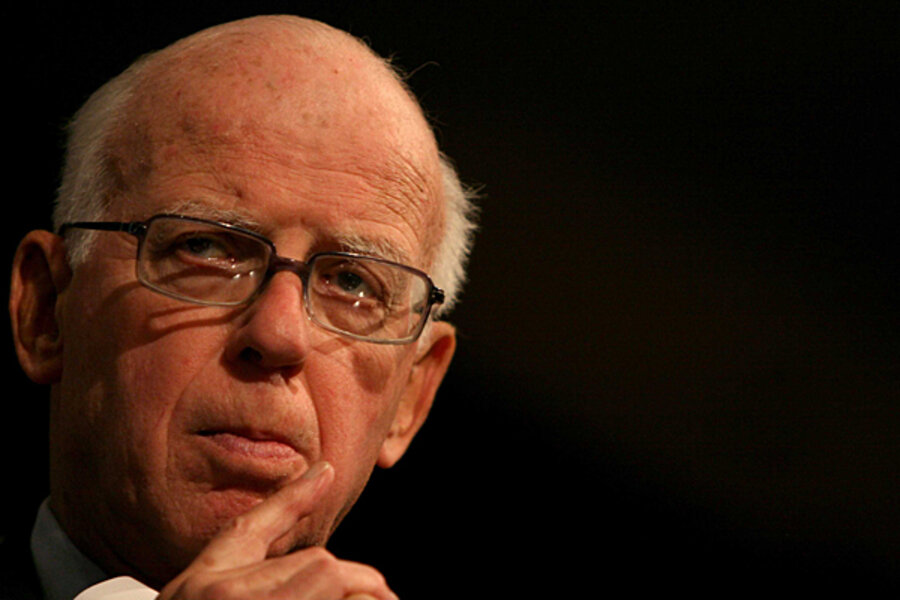Dave Broder, the late, great Washington Post reporter and columnist, was quite possibly the last nearly uniformly respected political journalist in America. Born in Illinois, Broder brought a middle western non-ideological sensibility to his reporting and commentary. Before his death in 2011, Broder was regularly named as the “most trusted,” the “fairest,” the hardest working scribbler in Washington.
Late is his long career, Broder was insightful – he was insightful about many things – as to the problems facing our politics and those who cover our politics. Trust was the problem he concluded.

“But this is now just sort of endemic,” Broder said in an interview in 1996. “I mean, if you are in politics, you are, by virtue of that fact, a subject of distrust. And if you are part of the press, they also figure that you’re playing some angle of your own. Or that you’re in bed with that sort of closed group–the insiders. And this is a country that is very suspicious of insiders.”
In his own low-key way, Dave Broder tried every December to address the trust gap. He published a column on the things he got wrong during the previous year. I’m no Dave Broder, but his example is a good one for anyone who pops off about politics and tries to make sense of politicians.
So here goes: some of what I got wrong in 2020.
Most mistakes I make, and I certainly make my share, are in the category of hope triumphing over experience. A lifetime of participating in politics and therefore thinking that experience makes you infallible is the ultimate hubris. My hubris was on full display when I suggested – more than once in 2020 – that American voters would broadly reject the politics of division and discord exemplified over the last four years by the man about to leave the White House.
Donald Trump was broadly rejected – a decisive loss in the Electoral College and crushing margin of the popular vote – but Republicans generally did very well in the November election. Far from repudiation the GOP came darn close to winning control of the House of Representatives, an outcome I could not bring myself to envision before November 3.
The GOP may still hang on to Senate control pending two runoff elections in Georgia. The “blue wave” that might have swept Democrats into a Senate majority seemed plausible to me until it wasn’t. I didn’t see Montana voters rejecting a popular governor running for the Senate against a Republican non-entity. I genuinely thought strong Democratic women in places like Iowa and Maine had a good chance. They didn’t. I was simply wrong about the breadth and depth of any rejection of Trump’s GOP.
I badly miscalculated the impact of the Republican campaign against “socialism” and “defunding the police.” Americans, I should have known, always reject socialism even as they embrace Medicare, Social Security, government built and operated hydroelectric dams and every sort of agricultural and tax subsidy. Socialism, as the arm waving Bernie Sanders has helped prove all over again, is the third rail of American politics. Most Americans couldn’t define the term, but they know socialism is bad.

And the left-wing sloganeering about defunding police was simply political malpractice by too many so called progressives who handed conservatives a huge and winning issue. The issue of redirecting law enforcement funding to substance abuse interventions and better community policing got hijacked by stupid, arrogant use of inflammatory language. I thought Democrats would be smart enough to reject the stupidity of a national message that dissed cops. I flat out underestimated the impact. I’m now convinced the issue nearly cost Democrats the House of Representatives.
I genuinely thought more Republicans beyond Mitt Romney, particularly after the election, would come to speak truth about what has happened to their party under Trump, how he has debased the very idea of truth and now continues a charade about a stolen election. I thought Idaho Congressman Mike Simpson, for example, who in his pre-Trump life was often a model of civility and bipartisanship, would do what he did in 2016 and pledge to carry out his Constitutional responsibilities and work cooperatively with a new president elect. I was wrong.
Simpson not only hasn’t done that, but he joined a ridiculous lawsuit seeking to overturn the presidential election. I was wrong in thinking politicians like Simpson would actually welcome a breaking of the Trump fever.
History will judge the administration of the last four years harshly for its incompetence, corruption and efforts to undermine democracy, but I genuinely thought even the most bungling administration in modern American history would figure out a plan to roll out a coronavirus vaccine. I mean, it’s complicated, but you have at your disposal the world’s best military. Many of the best scientists. The logistics and shipping capabilities of Amazon and FedEx. The administration promised that 20 million Americans would be vaccinated by now. They were wrong and I was wrong in thinking even this crowd couldn’t screw this up.
Back in October I wrote: “A fundamental principle of democracy is that people in power act in ways that preserve and protect the integrity of the institutions entrusted to their care. Having the power to act sometimes demand not acting. In our lifetimes there has never been a better moment to pause, consider and practice restrain.”
The moment was a Supreme Court vacancy being filled days before a presidential election. I thought, wrongly as it turned out, that the precedent Republicans established in 2016 when they refused for months to consider Barack Obama’s nominee would hold. I thought that GOP senators who had vowed to never fill a court seat in an election year would honor that commitment, or at least be shamed into doing so. I was wrong.
In order to understand the level of Senate majority leader Mitch McConnell’s cynicism you have to recalibrate your own cynicism. I thought it possible, before proven wrong, that he might have a moment of pause. I was wrong.
I’ll leave 2020 with another thought about Dave Broder and the long sweep of American politics. In 1971 – wow, nearly 50 years ago – Broder wrote a little book entitled The Party’s Over in which he worried about the state of the country. “It is going to cost us time and energy and thought, diverted from our private concerns,” Broder wrote, “to make government workable and politics responsible again in America.”
He was appealing for precisely the cure our diseased system needed then – and needs now. I hope I don’t have to admit next year that he – and we – were wrong.
—–0—–
Additional Reading:
Some stories from around the Internet that you may have missed…
A New Southern Manifesto
Nicolaus Mills, a professor of American literature at Sarah Lawrence College and author of Winning the Peace: The Marshall Plan and America’s Coming of Age as a Superpower, has an interesting piece in The Dispatch.
He links GOP allegations of voter fraud to efforts in the 1950’s – mostly from Democrats – to keep African Americans from voting.
“The targets of the Southern Manifesto were the nation’s black public school children, isolated in segregated schools. The unnamed targets of the Texas lawsuit and most other election suits filed by Trump supporters are mostly black voters in urban areas.
“What is more, just as the signers of the Southern Manifesto couched their language in neutral terms, saying separate but equal allowed for ‘amicable relations between the white and Negro races,’ the Trump supporters have followed a similar pattern. Rather than directly speak of race, they talk of “voter fraud.'”
The full piece is here.
Where Did America Go Wrong?

The German magazine Der Spiegel asks that question.
“America knows it is sick. It is showing all the symptoms. There are doubts about the legitimacy of elections, and confidence in political institutions has crumbled. The media have abandoned or lost their role as impartial observers. The country’s predominantly white police force continues to deploy misguided violence against a disillusioned and outraged Black population. There are armed militias on the streets and it’s become almost impossible to voice an opinion without getting overwhelmed by hateful comments on social media. To top it all off is a president who refuses to concede defeat, a society that has been battered by a pandemic that can only be contained by way of solidarity.”
Harsh, but fair. Read it here.
The State of America
Three more year end political pieces worth your time.
Bruce Gyory is a Democratic political strategist and an adjunct professor of political science at SUNY-Albany. He has a great piece in The Bulwark with a deep dive into the data about how Joe Biden won.
One of my favorite political journalist McKay Coppins in The Atlantic on the media and Biden. The White House spent four years vilifying journalists. What comes next? Read it here:
And a well-deserved piece in The Times about Boston College historian Heather Cox Richardson, a breakout star with her daily newsletter putting by-the-facts daily reporting in the context of American history. If you don’t get her newsletter, you should sign up. Here a link.
The World That Made Lincoln

“No one,” writes historian Allen C. Guelzo, “has been a better chronicler of 19th-century American culture than David Reynolds, a Distinguished Professor at the Graduate Center of the City University of New York.”
Guelzo reviews Reynold’s sprawling new Lincoln bio in The Washington Monthly.
“His 1008-page re-imagining begins with the bluntness of the title – Abe – since no one, once Lincoln had achieved adulthood, ever dared to address him as ‘Abe.’ To his closest friends, he was always Lincoln; even to his wife, he was Mr. Lincoln. His correspondence was invariably signed A. Lincoln, as though he found even Abraham overly familiar. Only on his most important state papers did he write out his name in full. But to the country at large, he was indeed Abe – Uncle Abe, Old Abe, Honest Abe, Abe Lincoln of Illinois. Good god you goin to shake with me Uncle Abe, was the cry of an astonished soldier to whom Lincoln stuck out his hand at a review. ‘Hey! Uncle Abe are you joking yet,’ was the satirical title of a political song in 1864.”
Well, I know what I should have asked Santa to deliver for Christmas. Read the review.
Thanks friends. It’s been quite a year. I really appreciate you following along. To a better 2021. Stay safe.
